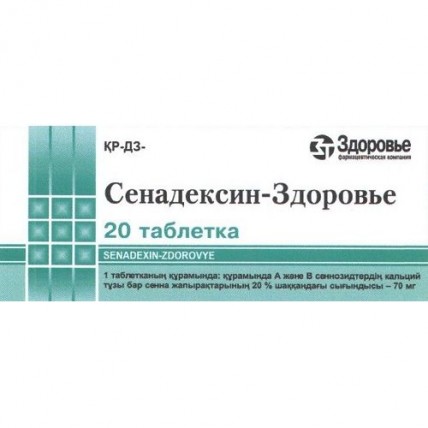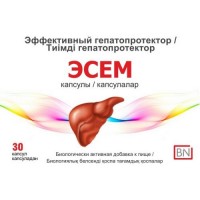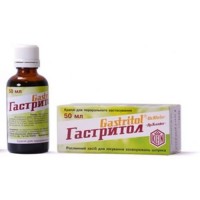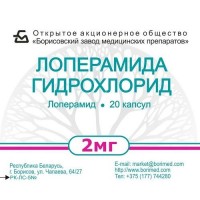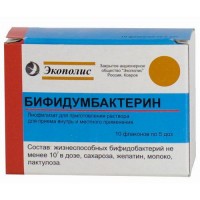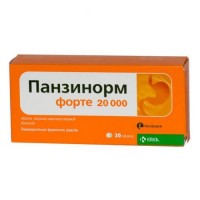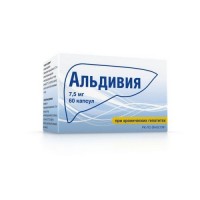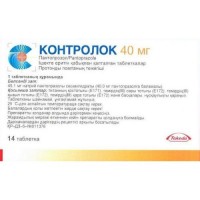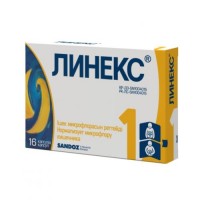The instruction
for medical use
of SENADEKSIN-ZDOROVE medicine
the Trade name
Senadeksin-Zdorovye
the International unlicensed name
Is not present
the Dosage form
of the Tablet of 70 mg
Structure
One tablet contains
active agent - extract of leaves of Senna of 70 mg, containing calcic salts of sennozid And yes In, in terms of 20%,
excipients: lactoses monohydrate, starch corn, vanillin, magnesium stearate, methylparahydroxybenzoate, stearic acid, talc, cellulose microcrystalline, sodium of a kroskarmelloz.
The description
of the Tablet ploskotsilindrichesky, with risky and a facet, from gray-brown till brown color with impregnations of more dark and lighter color, with a vanillin smell
Pharmacotherapeutic group
Laxatives. Contact depletive. Sennas glycosides.
The ATX A06A B06 code
the Pharmacological
Pharmacokinetics Later properties of intake of an antraglikozida (generally sennozida And yes C) are practically not soaked up in a stomach and a small intestine. In a large intestine are split on pharmacological active Anteronums and anthranols which are removed with a stake and also with urine. Are allocated also with then, in a small amount get into breast milk.
A pharmacodynamics
Senadeksin-Zdorovye – laxative drug of plant origin (a leaf of Senna or the Alexandria leaf, or a leaf of a cassia acutifoliate).
Pharmacological action is caused by antraglikozida (generally sennozida And yes C) and also other glycosides. At intake the glycosides of Senna pass through a stomach and a small intestine in not changed look. In a large intestine of an antraglikozida are split by colibacilli on pharmacological active Anteronums and anthranols which irritate interoretseptor of a large intestine, strengthen a vermicular movement and accelerate bowel emptying. Anteronums and anthranols interfere with absorption of water and electrolytes, diffusions of water in an intestines gleam promote. Owing to osmotic effect there is an increase in volume of stool, increase in filling pressure that promotes stimulation of a vermicular movement.
Laxative action is shown in 6–12 h. At prolonged use of drug the intensity of its action can decrease because of reduction of content of potassium in an organism.
Drug is well transferred by patients, in connection with the small content of resinous substances does not render irritant action on intestines.
Indications
- a chronic constipation
- hypo - and an intestines atony
- simplification of bowel emptying in hemorrhoids, a proctitis and anal fissures
- purgation before the diagnostic and medical
Route of administration procedures and doses
Accept inside, washing down with a small amount of liquid, usually before going to bed or in the morning.
To adults and children 12 years are more senior appoint 1-2 tablets a day. In the absence of effect it is possible to increase a dose to 3 tablets. Maximum daily dose 3 tablets. More than 1 week without consultation of the doctor are not recommended to take the drug.
Patients of advanced age are recommended to begin treatment with 1 tablet 1 times/day.
Side effects
Seldom
- anorexia, pain in a stomach, diarrhea
- urine coloring change
- allergic reactions
Are possible (at prolonged use)
- loss of electrolytes, generally potassium ions
- an albuminuria, a hamaturia
- an intestines pseudomelanosis
- an atony of a large intestine, a meteorism, digestion disturbances.
Contraindications
- the increased individual sensitivity to glycosides of Senna and other components of drug
- metrorrhagias
- intestinal impassability
- acute inflammatory bowel diseases (Crohn's disease, ulcer colitis, appendicitis)
- peritonitis
- a round ulcer of a stomach and duodenum
- gastrointestinal bleedings
- the restrained hernia
- cystitis
- pain in a stomach of unspecified genesis
- heavy disturbances of water and electrolytic balance
- children's age up to 12 years
- the hereditary intolerance of fructose, deficiency of Lapp-lactases enzyme, glucose galactose malabsorption
Medicinal interactions
Drug reduces efficiency of medicines which are slowly soaked up in a digestive tract. At simultaneous use from quinidine sulfate (antiarrhytmic drug) decrease in level of active ingredients in blood because of the competing properties with anthraquinone depletive is possible. Simultaneous use with cardiac glycosides owing to a hypopotassemia can cause cardiac arrhythmia. At simultaneous use with antiarrhytmic means, diuretics and corticosteroids muscle weakness develops. At prolonged use and/or use in high doses drug breaks absorption of tetracyclines.
Special instructions
Drug is recommended to be used only if normalization of bowel emptying does not manage to be reached change of a diet, it is necessary to accept the minimal effective dose necessary for restoration of normal function of intestines. The patients accepting the cardiac glycosides, antiarrhytmic means, drugs increasing QT interval, diuretics, corticosteroids or drugs on the basis of a licorice root should consult prior to use of drug with the doctor. If the cause of a constipation is unknown or there are complaints from a digestive tract (abdominal pain, nausea and vomiting), then before intake of depletive it is necessary that the doctor established the cause of a constipation as these symptoms can be signs of the impassability of intestines which is beginning or already available. Drug is intended for incidental use therefore with care and after preliminary consultation with the doctor take the drug if use of drug is carried out more than 1 week as prolonged use of the depletive stimulating activity of intestines can lead to strengthening of an atony of intestines. Drug should not be used for two hours after use of other medicines or in the doses exceeding recommended. The adults suffering from incontinence a calla (inkontinention) at administration of drug should avoid long contact of skin with a stake by change of laying (napkins). With care patients should use drug with diseases of a liver or kidneys, with chronic inflammatory bowel diseases. Drug contains lactose that should be considered to patients with the most rare hereditary forms of a lactose intolerance, insufficiency of lactase, a syndrome of glyukozo-galaktozny malabsorption.
Use in pediatrics
it is not recommended for use to children aged up to 12 years.
The period of pregnancy and a lactation
drug Use to pregnant women is possible only under observation of the doctor. Use of drug for pregnant women is accompanied by higher probability of development of side effects (abdominal pains, diarrhea). For the period of drug treatment the feeding by a breast is recommended to be stopped because components of drug can get into breast milk and cause frequent liquid depletion in the child.
Influence on a possibility of driving and potentially dangerous mechanisms
Drug usually does not influence a possibility of control of vehicles and performance of work, the requiring special attention, speed of mental and motor reactions. However it is necessary to check individual reaction to drug.
Overdose
Symptoms: diarrhea, disturbance of water-salt balance, intestinal gripes, irritation of bodies of a digestive tract, nausea, epigastric pain, spasms, deterioration in function of intestines, vascular collapse, metabolic atsidozirovanny Treatment: symptomatic, including gastric lavage. If there is a danger of serious diarrhea, rehydration (reception of a large amount of water) is recommended.
A form of release and packing
On 10 tablets in blister strip packaging from a film of polyvinylchloride and aluminum foil. On the 2nd blister strip packagings together with the instruction for medical use in the state and Russian languages place in a box of cardboard.
About 300 blister strip packagings together with the corresponding number of instructions for medical use in the state and Russian languages are allowed to put in a box from corrugated fibreboard.
To Store storage conditions at a temperature from 8 °C to 25 °C.
To store out of children's reach!
3 years
not to use a period of storage after an expiration date.
Prescription status
Without prescription
LLC Pharmaceutical Health Company Producer.
Ukraine, 61013, Kharkiv, Shevchenko St., 22.
Owner of the registration certificate
of LLC Pharmaceutical Health Company, Ukraine.
The address of the organization accepting in the territory of the Republic of Kazakhstan claims from consumers on quality of products (goods) of Pharm-Euro LLP 050039, Almaty, Mailing St., 72, apartment 34 Ph.: +7 (727) 271-10-17Факс: +7(727) 271-84-97E-mail:
To Develop farmevro@mail.ru
for medical use
of SENADEKSIN-ZDOROVE medicine
the Trade name
Senadeksin-Zdorovye
the International unlicensed name
Is not present
the Dosage form
of the Tablet of 70 mg
Structure
One tablet contains
active agent - extract of leaves of Senna of 70 mg, containing calcic salts of sennozid And yes In, in terms of 20%,
excipients: lactoses monohydrate, starch corn, vanillin, magnesium stearate, methylparahydroxybenzoate, stearic acid, talc, cellulose microcrystalline, sodium of a kroskarmelloz.
The description
of the Tablet ploskotsilindrichesky, with risky and a facet, from gray-brown till brown color with impregnations of more dark and lighter color, with a vanillin smell
Pharmacotherapeutic group
Laxatives. Contact depletive. Sennas glycosides.
The ATX A06A B06 code
the Pharmacological
Pharmacokinetics Later properties of intake of an antraglikozida (generally sennozida And yes C) are practically not soaked up in a stomach and a small intestine. In a large intestine are split on pharmacological active Anteronums and anthranols which are removed with a stake and also with urine. Are allocated also with then, in a small amount get into breast milk.
A pharmacodynamics
Senadeksin-Zdorovye – laxative drug of plant origin (a leaf of Senna or the Alexandria leaf, or a leaf of a cassia acutifoliate).
Pharmacological action is caused by antraglikozida (generally sennozida And yes C) and also other glycosides. At intake the glycosides of Senna pass through a stomach and a small intestine in not changed look. In a large intestine of an antraglikozida are split by colibacilli on pharmacological active Anteronums and anthranols which irritate interoretseptor of a large intestine, strengthen a vermicular movement and accelerate bowel emptying. Anteronums and anthranols interfere with absorption of water and electrolytes, diffusions of water in an intestines gleam promote. Owing to osmotic effect there is an increase in volume of stool, increase in filling pressure that promotes stimulation of a vermicular movement.
Laxative action is shown in 6–12 h. At prolonged use of drug the intensity of its action can decrease because of reduction of content of potassium in an organism.
Drug is well transferred by patients, in connection with the small content of resinous substances does not render irritant action on intestines.
Indications
- a chronic constipation
- hypo - and an intestines atony
- simplification of bowel emptying in hemorrhoids, a proctitis and anal fissures
- purgation before the diagnostic and medical
Route of administration procedures and doses
Accept inside, washing down with a small amount of liquid, usually before going to bed or in the morning.
To adults and children 12 years are more senior appoint 1-2 tablets a day. In the absence of effect it is possible to increase a dose to 3 tablets. Maximum daily dose 3 tablets. More than 1 week without consultation of the doctor are not recommended to take the drug.
Patients of advanced age are recommended to begin treatment with 1 tablet 1 times/day.
Side effects
Seldom
- anorexia, pain in a stomach, diarrhea
- urine coloring change
- allergic reactions
Are possible (at prolonged use)
- loss of electrolytes, generally potassium ions
- an albuminuria, a hamaturia
- an intestines pseudomelanosis
- an atony of a large intestine, a meteorism, digestion disturbances.
Contraindications
- the increased individual sensitivity to glycosides of Senna and other components of drug
- metrorrhagias
- intestinal impassability
- acute inflammatory bowel diseases (Crohn's disease, ulcer colitis, appendicitis)
- peritonitis
- a round ulcer of a stomach and duodenum
- gastrointestinal bleedings
- the restrained hernia
- cystitis
- pain in a stomach of unspecified genesis
- heavy disturbances of water and electrolytic balance
- children's age up to 12 years
- the hereditary intolerance of fructose, deficiency of Lapp-lactases enzyme, glucose galactose malabsorption
Medicinal interactions
Drug reduces efficiency of medicines which are slowly soaked up in a digestive tract. At simultaneous use from quinidine sulfate (antiarrhytmic drug) decrease in level of active ingredients in blood because of the competing properties with anthraquinone depletive is possible. Simultaneous use with cardiac glycosides owing to a hypopotassemia can cause cardiac arrhythmia. At simultaneous use with antiarrhytmic means, diuretics and corticosteroids muscle weakness develops. At prolonged use and/or use in high doses drug breaks absorption of tetracyclines.
Special instructions
Drug is recommended to be used only if normalization of bowel emptying does not manage to be reached change of a diet, it is necessary to accept the minimal effective dose necessary for restoration of normal function of intestines. The patients accepting the cardiac glycosides, antiarrhytmic means, drugs increasing QT interval, diuretics, corticosteroids or drugs on the basis of a licorice root should consult prior to use of drug with the doctor. If the cause of a constipation is unknown or there are complaints from a digestive tract (abdominal pain, nausea and vomiting), then before intake of depletive it is necessary that the doctor established the cause of a constipation as these symptoms can be signs of the impassability of intestines which is beginning or already available. Drug is intended for incidental use therefore with care and after preliminary consultation with the doctor take the drug if use of drug is carried out more than 1 week as prolonged use of the depletive stimulating activity of intestines can lead to strengthening of an atony of intestines. Drug should not be used for two hours after use of other medicines or in the doses exceeding recommended. The adults suffering from incontinence a calla (inkontinention) at administration of drug should avoid long contact of skin with a stake by change of laying (napkins). With care patients should use drug with diseases of a liver or kidneys, with chronic inflammatory bowel diseases. Drug contains lactose that should be considered to patients with the most rare hereditary forms of a lactose intolerance, insufficiency of lactase, a syndrome of glyukozo-galaktozny malabsorption.
Use in pediatrics
it is not recommended for use to children aged up to 12 years.
The period of pregnancy and a lactation
drug Use to pregnant women is possible only under observation of the doctor. Use of drug for pregnant women is accompanied by higher probability of development of side effects (abdominal pains, diarrhea). For the period of drug treatment the feeding by a breast is recommended to be stopped because components of drug can get into breast milk and cause frequent liquid depletion in the child.
Influence on a possibility of driving and potentially dangerous mechanisms
Drug usually does not influence a possibility of control of vehicles and performance of work, the requiring special attention, speed of mental and motor reactions. However it is necessary to check individual reaction to drug.
Overdose
Symptoms: diarrhea, disturbance of water-salt balance, intestinal gripes, irritation of bodies of a digestive tract, nausea, epigastric pain, spasms, deterioration in function of intestines, vascular collapse, metabolic atsidozirovanny Treatment: symptomatic, including gastric lavage. If there is a danger of serious diarrhea, rehydration (reception of a large amount of water) is recommended.
A form of release and packing
On 10 tablets in blister strip packaging from a film of polyvinylchloride and aluminum foil. On the 2nd blister strip packagings together with the instruction for medical use in the state and Russian languages place in a box of cardboard.
About 300 blister strip packagings together with the corresponding number of instructions for medical use in the state and Russian languages are allowed to put in a box from corrugated fibreboard.
To Store storage conditions at a temperature from 8 °C to 25 °C.
To store out of children's reach!
3 years
not to use a period of storage after an expiration date.
Prescription status
Without prescription
LLC Pharmaceutical Health Company Producer.
Ukraine, 61013, Kharkiv, Shevchenko St., 22.
Owner of the registration certificate
of LLC Pharmaceutical Health Company, Ukraine.
The address of the organization accepting in the territory of the Republic of Kazakhstan claims from consumers on quality of products (goods) of Pharm-Euro LLP 050039, Almaty, Mailing St., 72, apartment 34 Ph.: +7 (727) 271-10-17Факс: +7(727) 271-84-97E-mail:
To Develop farmevro@mail.ru
